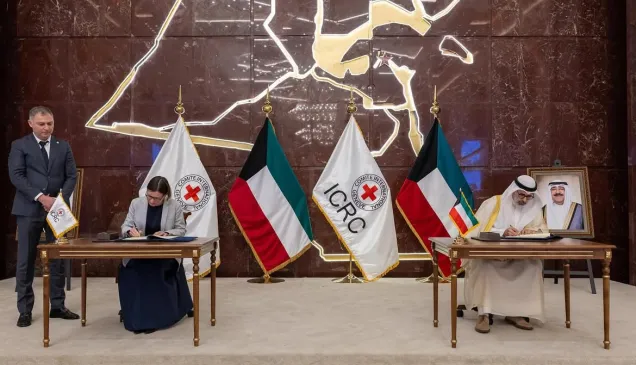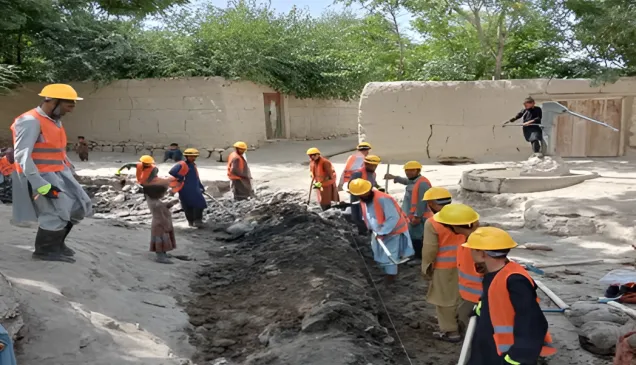Briefing by ICRC President Peter Maurer to UN Security Council on the Protection of Civilians in Armed Conflict: Missing Persons in Armed Conflict
Some of the most horrific consequences of war are those that we cannot see. When traumas are invisible, they are overlooked, ignored or deprioritized.
This is perhaps most starkly evident when it comes to the critical issue of missing persons. Every day people go missing because of conflict, violence, disaster and during migration.
Today, as we focus on the issue of missing persons in armed conflict, I have to report that the ICRC has observed an alarming increase in cases in recent years.
In 2018 alone over 45,000 new cases were registered by the ICRC's Central Tracing Agency – the neutral entity mandated by the Geneva Conventions. We know this figure is the tip of the iceberg and does not convey the true extent of the problem nor does justice to the suffering of each and every family.
Thank you to Kuwait for your stewardship in bringing forward this debate today. The ICRC welcomes the adoption of this resolution as the first UN Security Council resolution fully dedicated to the issue of missing persons in conflict and commends the Council's commitment to this issue.
Every time someone goes missing, families wait for answers. Ricocheting between hope and despair, they mark anniversaries – one year, two years, ten years.
The trauma of ambiguous loss is one of the deepest wounds of war. The pain infects whole communities, lasting decades, preventing societies from reconciling.
The ICRC is a daily witness to this suffering. Our teams are frequently approached with pleas for help: mothers searching for sons, husbands searching for their wives.
And sometimes there are answers: every minute the ICRC, together with National Red Cross and Red Crescent Societies, helps a family separated by conflict restore contact.
Yet so much more can be done. If parties to the conflict fulfil their obligations to search for missing persons and if they manage the dead systematically and with respect; missing persons can be found, remains can be identified and answers can be given.
We have the legal framework: International humanitarian law sets out obligations on preventing persons from going missing in armed conflict and clarifying of the fate and whereabouts of those who do.
And we have practical experience: Preventing family separation (for instance during evacuations), registering all persons deprived of their liberty or issuing identity disks to armed forces are all concrete steps which can be taken today.
What is needed is stronger political will and cooperation. This is crystal clear to the ICRC – as custodians of international humanitarian law, and from decades of experience working with parties to conflicts to resolve cases of missing persons.
The ICRC's work extends from chairing coordination mechanisms, advising on national laws and policies, to registering detainees, supporting families and offering technical forensic expertise.
We have seen what can be achieved through political will and cooperation. The agreement on identifying the remains of unidentified soldiers involved in the Falkland/Malvinas Islands conflict is a striking example. And we also note too, the joint efforts of the Gulf War Tripartite Commission on the recovery of remains in southern Iraq in just the last few weeks. These breakthroughs offer enormous hope to families who have waited for decades for answers.
Today's wars pose new challenges but also new opportunities to search for missing persons. While the issue remains complex, there is now a wealth of new sources of information that can facilitate the search. As the ICRC's Central Tracing Agency prepares to mark 150 years of service next year, we are modernizing our approaches, including to invest in improved search technologies such as facial recognition.
Additionally, there is a growing body of expertise and experience, including in forensic science, to improve prevention and response tactics. The ICRC is building a community of practice and through the Missing Persons Project it is reaching out to experts and practitioners, international and non-governmental organizations, state institutions and families to identify best practices, develop technical recommendations and coordinate our efforts.
It is clear to us that the way in which the issue of missing persons is addressed during and after conflict can determine the scale of the problem, its repercussions on communities, and the future relations between parties to the conflict.
Crucially: cases of missing persons need to be handled without discrimination – missing persons and their families are not a bargaining chip.
I urge Member States – in implementing today's resolution and beyond – to adopt these four steps:
First, States and parties to armed conflicts must respect and ensure international humanitarian law is respected in their operations. They must uphold families' right to know; ensure civilians are protected, ensure no one 'disappears' in armed conflict as result of hostilities or after arrest; and to ensure systematic and dignified management of the dead.
In particular, we call on parties to conflict to enable ICRC to access detention facilities and facilitate family contact. This important step would go a long way in preventing those detained from going missing.
Secondly, States must put in place preventative measures. Without early action, the work to account for missing people only redoubles, as does the suffering of families, and the future support required to address their needs.
Obligations do not start after hostilities come to an end.
Thirdly, the issue of the missing must be first and foremost humanitarian and not part of political agendas and accountability processes.
States must address cases of missing persons without discrimination. Too often we see political manipulation of this issue, or families of former enemies stigmatized or blocked from service.
And finally, States must support professional, neutral, impartial humanitarian action on the issue of the missing.
Through your technical experts and institutions you can join efforts with the ICRC, local and international organizations to support the creation of a global community of practice and universally recognized technical standards and recommendations.
We urgently need stronger political will and commitment from all actors to implement their obligations on the missing. We ask States to live up to their responsibilities and to take the necessary steps to address this profound yet overlooked humanitarian challenge.



